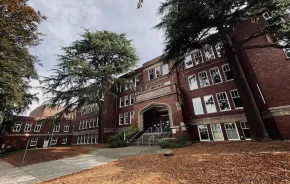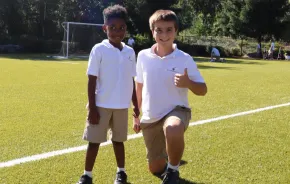
Editor's note: This article was sponsored by Laurel Springs School.
If you’re like me, you’ve probably railed against test retake policies — there are no retakes in real life! There should be consequences for not studying! But not so fast; it turns out that retaking tests isn’t just about getting away with slacking. It’s one part of a teaching approach that yields powerful benefits for the most diligent students. Called mastery-based learning, it’s far from relaxing standards: It’s designed to ensure that no student gets either left behind or held back.
“Mastery-based learning is the ability to keep on learning the material until you reach a level of mastery. A school might define that as 70 percent on every assignment in the course. But a student may define their own mastery level and try to achieve a higher standard,” explains Dean of Academy Cory Plough at the private online K–12 Laurel Springs School.
The cohort curse
“A driven kid stuck in a classroom can feel constantly held back. Their peer group might not be as interested in academics. Maybe the teacher’s going too slow for them. Those students might benefit from being able to work at an accelerated pace in an independent learning model,” says Plough. At the same time, he adds, “Sometimes students have extremely high expectations of themselves.” That perfectionism can lead to frustration when a student doesn’t get a project exactly right and they are forced to settle for the results of their first attempt.
“In a mastery-based program, you have the ability to redo that. Exceptional students also often have a need for precision in language; a teacher may say something a certain way that doesn’t fit with how they think,” says Plough. “When they have the ability to be one on one and talk to the teacher and work out the meaning, it really helps them.”
This truly individualized approach is not possible in a standard classroom, where teachers have to try to keep the whole class moving at more or less the same pace. This means that parents whose kids are not in an individualized program need to advocate for their students.
Classroom teachers do have tools to tailor classwork. They can cluster same-level students in small groups, allow test retakes or modify assignments to suit individual abilities. When a child is really ahead of the pack, they may even recommend moving a student into an accelerated program or having them skip a grade. But there’s only so much tailoring that can be achieved in the classroom, and for some gifted and driven children, it might not be enough.
Driven and gifted
Resources for advanced learning are often among the first to be cut when budgets are tight, because there’s an impression that smart kids don’t need help to succeed in school. But gifted students can struggle to succeed in a regular classroom.
“A lot of students who are stuck in an inappropriate level become bored and frustrated. They might become more introverted or become bigger procrastinators,” says Plough. Bored students may become disruptive or inattentive. Slipping grades can result in students who are given remedial work when what they really need is accelerated learning. Gifted students of color are particularly at risk of going unrecognized.
Many gifted students are driven, but gifted and driven are not necessarily the same thing.
“Gifted students might have the ability to absorb information very quickly and to work several grade levels ahead of their peers. They might be more curious than the average student or have higher expectations of themselves,” says Plough. “Driven students are very goal-oriented, trying to get to a certain place with either their academics or their future. A lot of kids have passions they want to pursue, whether it’s sports or maybe they’ve started working early.”
For gifted and academically driven students, the goal may be accelerated learning. But for students whose drive is focused outside of school, it may be efficiency — meeting baseline requirements quickly so that the student has more time to pursue their passions. Either way, a mastery-based independent learning program may be the best choice.
(Extra) curricular support
When changing schools is not an option, parents and teachers need to work together to engage the curiosity of exceptional students. Look for ways to let them dive deeper into a topic than the rest of the class or pursue their fascination with a subject that isn’t even covered in regular coursework.
“Being in a program where they are offered many opportunities that provide them all kinds of avenues to explore their curiosity is extremely important,” says Plough.
When classroom learning isn’t enough to scratch a child’s intellectual itch, focus attention on extracurricular activities. Enrichment opportunities such as interest-based clubs can provide critical connection, both intellectually and socially, with like-minded peers. If you can’t find or create an appropriate club at school, outside classes and camps can help kids develop their passions.
Laurel Springs offers part-time enrollment for students who are already attending another school. Also online, Art of Problem Solving is an interactive, collaborative math program. Locally, organizations such as The Bureau of Fearless Ideas offer academic enrichment in a playful context, while many museums offer youth engagement programs. For older students, explore the possibility of dual enrollment at a community college, or look for internship and volunteer opportunities in your child’s area of interest.
Emotional support
“Gifted students often feel things more powerfully and more sensitively than others. They can have emotional depths that their peers haven’t reached yet, especially regarding social awareness and self-awareness. A big issue for gifted and driven kids is that they can just feel out of place all the time,” says Plough.
Finding like-minded peers who share their drive or their interests can make a world of difference. But exceptional students may need help from trained counselors to figure out where they fit. Many schools can’t offer this level of support, so parents need to educate themselves about how their child’s ambitious brain works. Understanding what your child needs will make you a better parent at home and a better advocate at school.
Learning resources for parents of gifted and driven students
The counseling department at Laurel Springs recommends the following resources that have been helpful to the parents of gifted and driven children in their program.
- “The Whole-Brain Child” by Daniel J. Siegel, M.D., and Tina Payne Bryson, Ph.D.
- “How to Talk So Kids Will Listen & Listen So Kids Will Talk” by Adele Faber and Elaine Mazlish
- “How to Raise an Adult: Break Free of the Overparenting Trap and Prepare Your Kid for Success” by Julie Lythcott-Haims
- “The Highly Sensitive Child: Helping Our Children Thrive When the World Overwhelms Them” by Elaine Aron and Susan Boyce
|
Sponsored by: |












